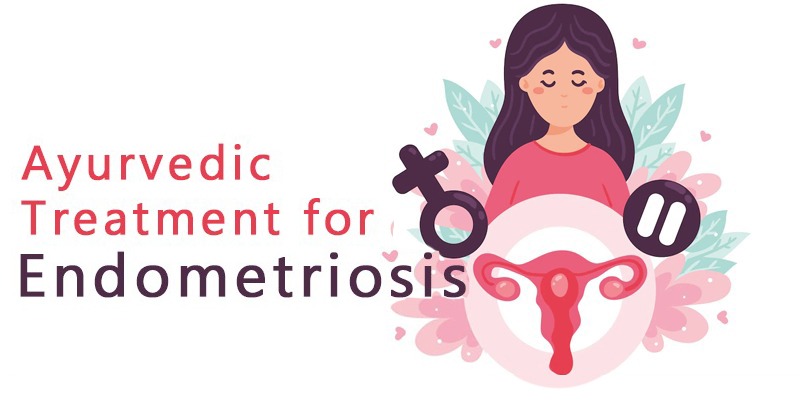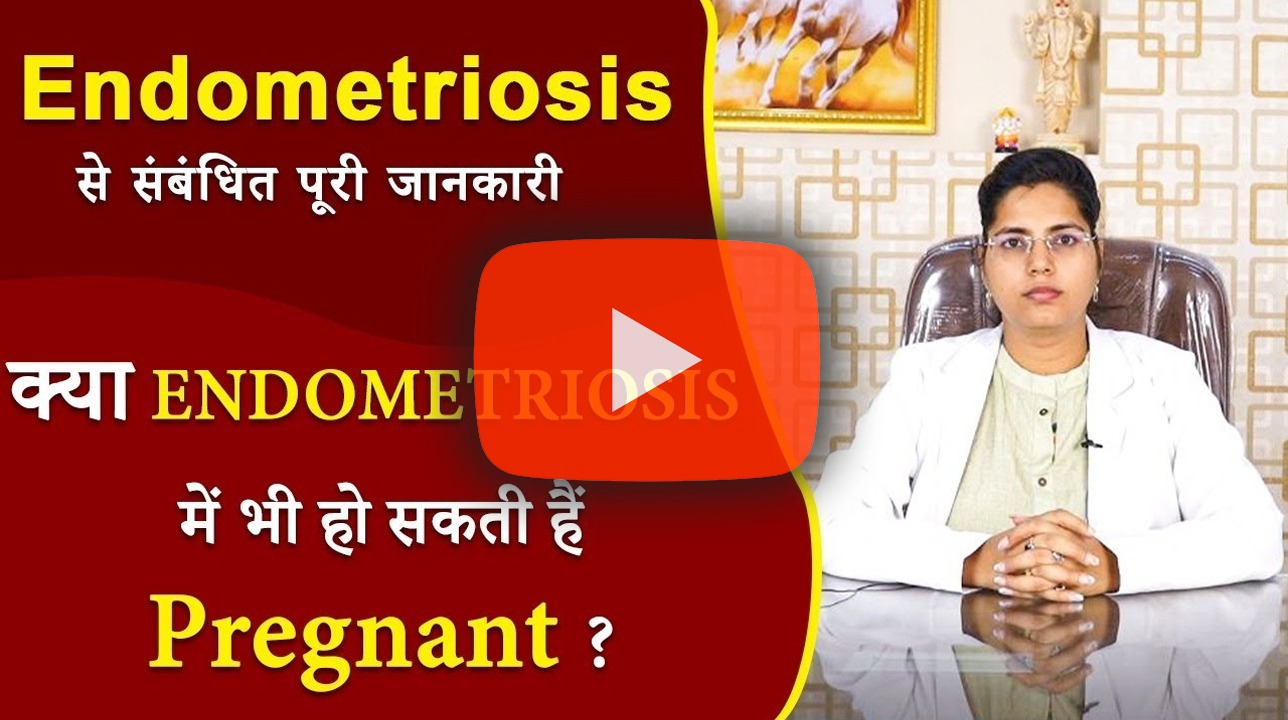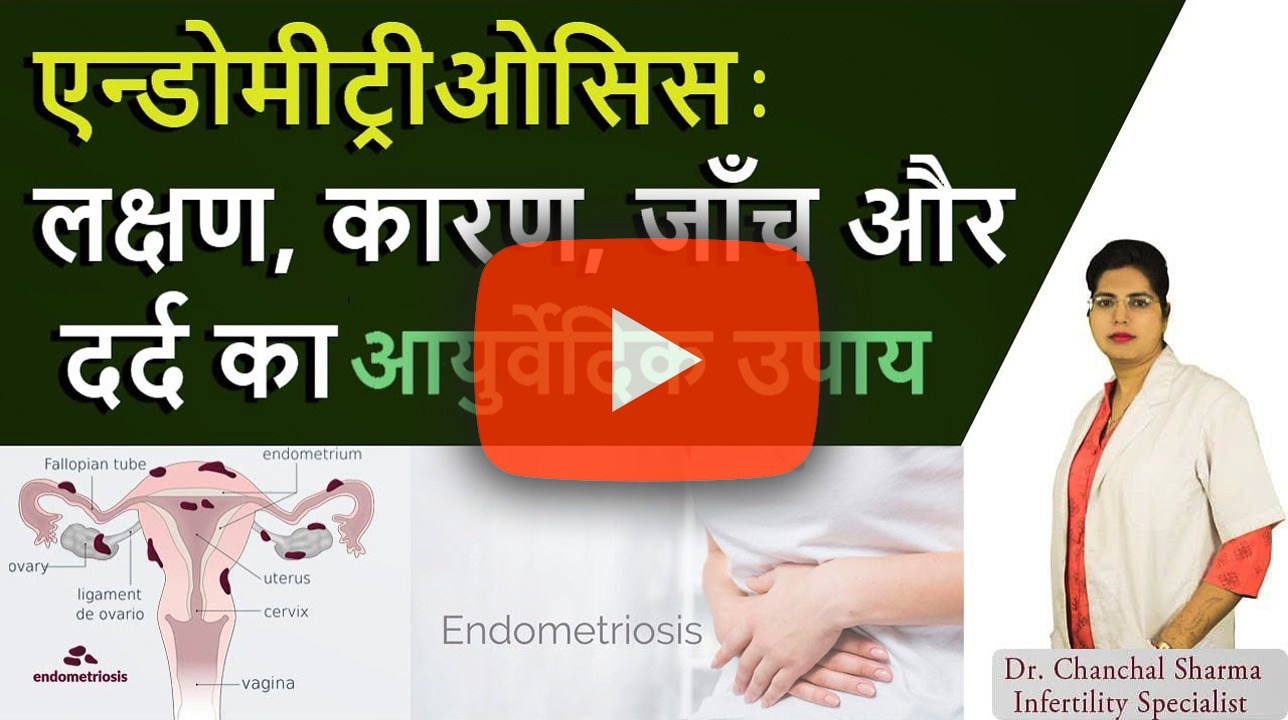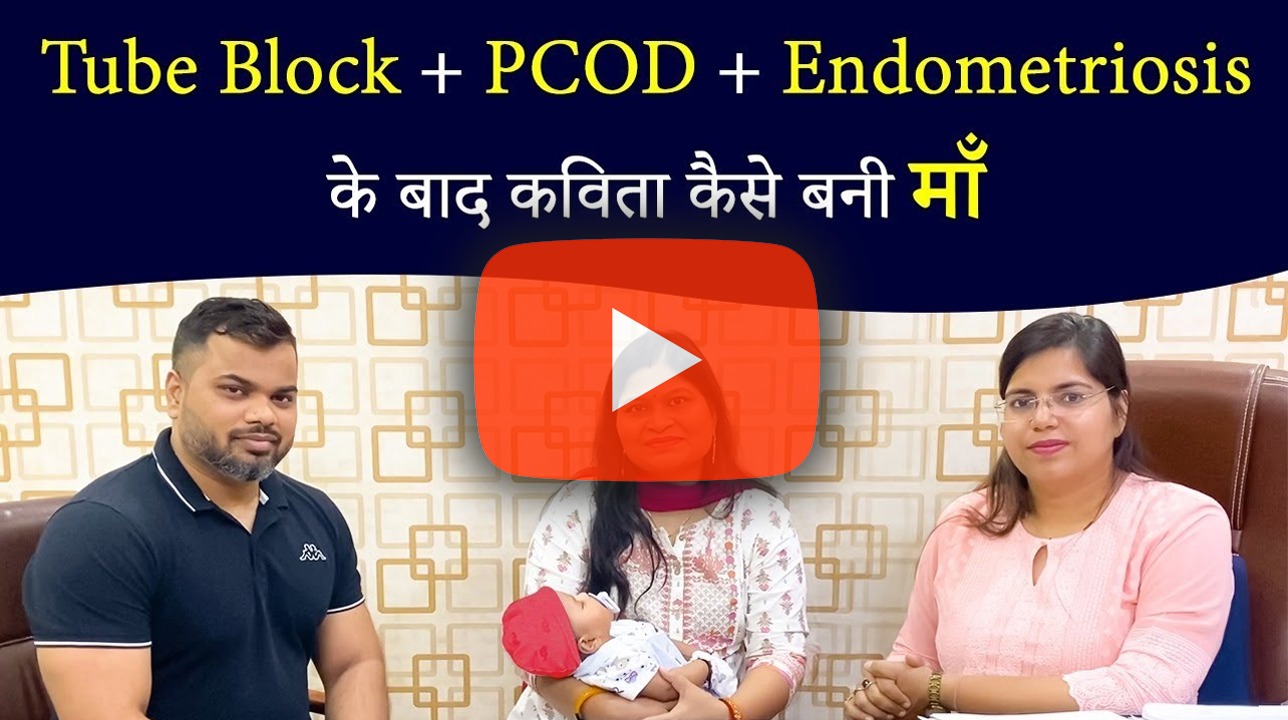Endometriosis Treatment
Endometriosis: Causes, Symptoms, Diagnosis & Treatment and Aasha Ayurveda Patient Fertility Success Story
We are successfully helping
infertility with endometriosis patients all over the world. So, Don’t take endometriosis as a non curable disease. Manage it with Ayurveda successfully with Aasha Ayurveda
Endometriosis is a chronic and often misunderstood condition affecting millions of women worldwide. It occurs when tissue similar to the uterine lining grows outside the uterus, leading to pain, irregular bleeding, and potential fertility challenges. At Aasha Ayurveda Clinic, we believe in addressing endometriosis through holistic, non-surgical Ayurvedic treatments that aim to restore balance and promote healing from within.
What Is Endometriosis?
Endometriosis is a disease related to female health. In this disease the tissue starts growing outside the uterus. It can grow anywhere in your reproductive organ such as ovary, fallopian tube or pelvic endometrium. In some cases, it can harm your bowel, lungs or even your bladder. This may cause hormonal changes in your body during the menstrual cycle. It may cause pain, inflammation and adhesions.
What Are the Symptoms of Endometriosis?
-
Heavy bleeding during periods: females might be discomfortable during periods because of excessive bleeding or cramps.
-
Pain during sex: women may experience pain in their pelvic area while having sex.
-
Painful urination: females with endometriosis might have trouble urinating.
-
Chronic fatigue: A general feeling of tiredness or lack of energy.
-
Infertility: Difficulty conceiving, which affects a significant number of women with endometriosis.
What Causes Endometriosis?
There are several theories related to what causes endometriosis but the exact causes still remain undecided or unclear.
- Retrograde menstruation: sometimes the cause of endometriosis can be the backward flow of period blood.
- Embryonic cell transformation: Hormonal changes during puberty may transform embryonic cells into endometrial-like cell implants during adulthood.
- Immune system disorders: Immune system issues may prevent the body from producing endometrial-like tissue that grows outside the uterus.
- Factors related to genetics: Endometriosis often runs in families, indicating a hereditary propensity.
Who Can Get Endometriosis?
-
A family history of endometriosis.
-
Short menstrual cycles (less than 27 days).
-
Heavy menstrual periods lasting more than 7 days.
-
Never given birth.
-
Medical conditions such as uterine abnormalities or pelvic infections.
Risk Factors of Endometriosis
There are various risk factors that may increase the chance of growing endometriosis:
- Early onset of menstruation: Beginning menstruation before age 11.
- Short menstrual cycles: Cycles lasting less than 27 days.
- Heavy menstrual periods: Periods lasting more than 7 days.
- Low body mass index (BMI): Being underweight may increase risk.
- Environmental factors: Exposure to certain chemicals and toxins may play a role.
What Complications Can Endometriosis Cause?
-
Infertility: Between one-third and one-half of endometriosis-affected women have trouble becoming pregnant.
-
Ovarian cysts: "Chocolate cysts," another name for endometriomas, are cysts that contain ancient blood.
-
Adhesions and scar tissue: Bands of fibrous tissue can form, leading to organs sticking together.
-
Chronic pain: Persistent pelvic pain can affect daily activities and quality of life.
-
Increased risk of certain cancers: Slightly higher risk of ovarian cancer, though overall risk remains low.
How Does Endometriosis Cause Infertility?
Endometriosis can affect fertility in several ways:
- Fallopian tube damage: Scar tissue can block the fallopian tubes, preventing the egg from meeting the sperm.
Ovarian function impairment: Endometriomas can interfere with normal ovarian function. - Altered immune response: Inflammation may affect the quality of eggs and sperm.
Hormonal imbalances: when the hormone level of a female becomes unbalanced then it can adversely affect your ovulation and capacity to give birth.
How Is Endometriosis Diagnosed?
-
Pelvic examination: To check for abnormalities.
-
Ultrasound: To visualize cysts or other abnormalities.
-
Magnetic resonance imaging (MRI): MRI is the test conducted to diagnose endometriosis through the image of pelvic organs.
What Is the Treatment of Endometriosis?
The traditional treatment for endometriosis often includes operation and oral medications. However, at Aasha Ayurveda Clinic, we focus on holistic Ayurvedic approaches that aim to balance the body's energies and promote natural healing without the need for invasive procedures.
How to Pregnancy Conceive with Endometriosis
There are a number of ways to improve your chances of getting pregnant if you have endometriosis. While many endometriosis-affected women conceive naturally, some may require in vitro fertilization (IVF). Fertility can also be increased by treating the underlying disease, whether with medication or surgery.
Although it might take longer than for women without the illness, some endometriosis sufferers conceive spontaneously. The best timing is to monitor your menstrual cycle and attempt to have sex around ovulation. See a fertility specialist if, after six months of trying, you have not conceived, particularly if you are older.
Ayurvedic Treatment for Endometriosis
There are lots of treatments available in the market for endometriosis but the ancient system of medicine, ayurveda, offers you the best treatment among them. Ayurveda has the potential to focus on the root cause of endometriosis and provides the treatment accordingly. The treatment plan may include:
- Dietary modifications: Emphasizing anti-inflammatory foods and avoiding those that increase Pitta dosha, such as spicy, sour, and processed foods.
- Herbal remedies: Utilizing herbs like Shatavari, Ashwagandha, Turmeric, and Lodhra to balance hormones, reduce inflammation, and support reproductive health.
- Panchakarma therapy: A detoxification process that includes treatments like Abhyanga (oil massage), Swedana (herbal steam therapy), and Basti (medicated enemas) to cleanse the body and restore dosha balance.
- Lifestyle changes: Incorporating stress management techniques, regular physical activity, and adequate rest to support overall well-being.
Success Story: Aasha Ayurveda's Approach to Healing
At Aasha Ayurveda Clinic, we have witnessed numerous success stories of women overcoming the challenges of endometriosis through our holistic treatment approach. One such case is that of Priya, a 32-year-old woman who had been struggling with severe pelvic pain and infertility for several years. After undergoing multiple conventional treatments with limited success, Priya turned to Ayurveda.
Under the guidance of our experienced practitioners, Priya embarked on a personalized treatment plan that included dietary changes, herbal supplements, Panchakarma therapies, and lifestyle modifications. Within a few months, she experienced significant relief from pain and improved menstrual regularity. After six months of consistent treatment, Priya conceived naturally and delivered a healthy baby boy.
Her success story is a testament to the effectiveness of Ayurvedic treatments in managing endometriosis and restoring reproductive health.
If you want more information on this topic or other PCOS/PCOD Treament, fallopian tube blockages treatment , or hydrosalpinx treatment. Visit our website Aasha Ayurveda
Consult our highly experienced and trained fertility specialists and gynecologists at these five branches of Aasha Ayurveda in Delhi, Mumbai, Pune, Hyderabad and Lucknow for a completely confidential consultation and get the best treatment for PCOD, PCOS, or female infertility.

BEST ENDOMETRIOSIS TREATMENT IN DELHI, INDIA WITH AYURVEDA
Endometriosis management with Ayurveda
Endometriosis is the growth of endometrial tissue at various abdominal sites outside the uterus instead of its normal position that is Uterus. This hormonally active tissue which bleeds on monthly basis may end up growing around the Fallopian tubes, pelvic area, ovaries, rectum, intestinal area etc. Consequently, this endometrial tissue grows and sheds at abnormal places and creates lots of pain in the pelvis, lower abdomen area, and around the uterus.
COMMON SYMPTOMS FOUND IN ENDOMETRIOSIS ARE -
- Lower abdominal pain
- Severe backache
- Dysmenorrhea
- Menorrhagia
- Bloody urine
- Pain during defecation
- Painful intercourse
- Heavy or irregular bleeding
- Infertility
- Repeatitive abortions
- Repeatitive IVF failures.
- Some women with endometriosis Suffers no pain and symptoms.
ETIOLOGY OF ENDOMETRIOSIS AS PER AYURVEDA
According to Ayurveda, endometriosis is developed in the body when toxins accumulate in the uterine tissue and to disturb the balance of the tissue growth in the uterus. These toxins obstruct the channel of circulation and elimination in the affected areas. This blockage in channel prevents the removal of tissue wastes. As a result, more toxins build up and natural biological cycle of endometrial growth and shedding is disturbed. In the endometriosis, specifically, chronic toxin accumulation in the reproductive tissue disturb the tissue growth and it results in accumulation of excess tissues.
As per Ayurveda, endometriosis is Vaata Kapha dominant disease due to increasing number of cells and overgrowth of the endometrium outside the uterus. It has also involvement of Pitta Dosha because of involvement of blood , menstrual hormones and inflammatory nature. Also, there is Apaan Vayu involvement in the downward movement of menstrual blood. Displacement of endometrial cells shows the role of Vata Dosha. Endometriosis, therefore, we can say that endometriosis is a Sannipataj condition because it involves all doshas in variable proportion according to individual patient.
Endometriosis being the Vaat dominant obustruct the Apana Vayu which holds the Pitta ( blood) and causes it to move up and nearby. Pitta dosha then vitiates and causes heavy bleeding and inflammation. It also creates irritation which induces Kapha to enter tissues and coating the irritated area. This Kapha involvement causes build up of cells and growth.
TREATMENT OF ENDOMETRIOSIOS WITH AYURVEDA
Management of endometriosis with Ayurveda
Since, it is developed due to accumulation of Doshas in the tissues, Ayurvedic treatment of Endometriosos focuses on the elimination of toxins, Improving digestion, proper nutrition and balance of Mind and Soul. Ayurveda approaches on self healing power of body. We balance the doshas and disease is cured. We focus on-
- Nidana Parivarjana- Excess intake of Junk food, oily, spicy, fermented food products etc.
- Detoxification - Shodhana with Ayurveda to remove toxins from body. Organ cleansing like liver, kidney dotoxification. This is done with Panchakarma treatment.
- Digestive issues are resolved with Ayurvedic herbal Medications. It focuses on Agni Deepan and proper nutrition.
A combination of Abhyangam, Shirodhara, Swedanam and Basti are given for 7 days or more depending upon the patient along with the proper diet for endometriosis . After that Virechana panchakarma procedure is given. And at last vamana is done. Thus, all the doshas are balanced and Aama dosha is eliminated from the body.
This way, we at the Ayurvedic clinic for Endometriosis treatment in Delhi, India are treating the Endometriosis successfully under the guidahnce of Best Ayurvedic Doctor in Delhi.
We are successfully helping infertility with endometriosis patients all over the world. So, Don’t take endometriosis as a non curable disease. Manage it with Ayurveda successfully with Aasha Ayurveda.
Frequently asked questions
- What is difference between PCOD and PCOD ?
- Can PCOS be cured naturally?
- How much time IVF takes?
- What is the cost of IVF Program?
- What is IUI Process?
- Is IVF process painful?
- What is success rate of IVF ?
- What treatment is available for low sperm?
- How Ayurveda Treat Diseases ?
- How IVF process Works?
- How to increase Success rate of IVF ?
- What are the signs and symptoms of blocked fallopian tubes?
- What is Blocked Fallopian Tubes ?
- How do you treat blocked fallopian tubes ?
- How do you unblock fallopian tubes?
- How to get pregnant with blocked fallopian tubes ?
- Fallopian Tube blockage treatment without surgery ?
- What are causes of blocked fallopian tubes ?
- What is the treatment for PCOS/ PCOD problem?
- Is it hard to conceive with PCOS?
- Does everyone with PCOS have fertility problems?
- What is pcos treatment to get pregnant?
- What is ICSI ?
- What is IVF ?
- IVF Failure what to do now ?
- What is the difference between male infertility and female infertility?
- What are the signs of infertility?
- What is treatment of infertility ?
- What is cost of infertility treatment?
- What is the best ayurvedic treatment of infertility in india?
- What is female infertility?
- What are the main causes of female infertility?
- What are the signs of infertility in a woman?
- what is pcos and pcod ?
- what are the early signs of pregnancy with pcos ?
- What is Ayurvedic Treatment for Blocked Fallopian Tubes in Hindi?
- what is the treatment for pcos in homeopathy ?
- what is the treatment for pcos problem ?
- Who is best doctor for tubal blockage treatment in Delhi ?
- What is male infertility?
- What is the sign and symptoms of male infertility?
- What causes infertility in men?
- How do you treat male infertility naturally?
- What is Panchakarma therapy?
- Is Panchakarma good for pregnancy?
- What is the cost of Panchakarma Treatment?
- Does Ayurveda help fertility?
- What treatments for polycystic ovary syndrome (PCOS) can help you get pregnant?
- How Do I Know If I Have PCOS?
- What is tubal blockage
- Causes of blocked fallopian tubes?
- Ayurvedic Treatment of Blocked Fallopian Tubes?
- Can fallopian tubes be blocked after first pregnancy?
- Can abortion cause blockage of fallopian tubes?
- Can you still ovulate if your fallopian tubes are blocked?
- How painful is HSG test?
- Can HSG test open blocked tubes?
- Where is Best Tubal Blockage Treatment in Delhi
- Best Ayurvedic Centre for Infertility Treatment in Delhi
- Where is Tubal Blockage Treatment in Rajouri Garden
- Where is Ayurvedic Doctors For Tubal Block in India
- Is Chanchal Sharma is best ayurvedic doctors for tubal blockage
- Is there Ayurvedic Doctors For Tubal Block In Delhi who give best treatment ?
- Ayurvedic Doctors For Tubal Block In Rajouri Garden?
- Which is the best ayurvedic treatment center in Rajouri Garden?
- Which is the best Fallopian Tube Treatment In Rajouri Garden?
- Which is the best Fallopian Tube Blockage Treatment In Delhi?
- Which is the best Treatment For Blocked Fallopian Tube In Delhi?
- Is there treatment centre for blocked fallopian tube in Rajouri Graden?
- Which is the best ayurvedic centre for infertility treatment in Delhi?
- What is the easy procedure of Fallopian Tube Treatment In Delhi?
- Which is best Ayurvedic Doctors For Pcos In Rajouri Garden?
- Is Tubal Blockage Treatment Good In Ayurveda?
- Is there any Ayurvedic Medicine for Blocked Fallopian Tubes?
- Which is best Ayurvedic clinic in Rajouri Garden in Delhi, India?
- Where is best tubal blockage treatment center in Delhi?
- What are the types of Fallopian Tube Blockage Treatment In Ayurveda?
- Who is best doctor for Ayurvedic treatment for blocked fallopian tubes?
- What are Natural Treatment For Blocked Fallopian Tubes?
- Is it Possible Fallopian Tube Blockage Treatment Without Surgery?
- Is there Natural Remedies for Blocked Fallopian Tubes?
- Is there Ayurvedic Medicine for Blocked Fallopian Tubes?
- What is Fallopian Tube Blockage Treatment Cost in Ayurveda?
- What is panchakarma treatment for conceiving?
- Is Ayurvedic panchakarma treatment for PCOS is best?
- What is Panchakarma therapy for PCOS and its benefits?
- Who are the best Ayurvedic Doctor For Pcos In Delhi?
- Where is centre who give Polycystic Ovary Syndrome Treatment In Delhi?
- Which is best Polycystic ovary syndrome treatment centers in Delhi?
- Which Ayurvedic medicine is good for fertility?
- Which Ayurvedic herbs used in the treatment for infertility?
- What is best ayurvedic treatment for pcos in delhi?
- How can I find a ayurvedic doctors with high success rate in delhi?
- Which is best centre for Panchakarma Treatment For Pcos?
- What is Pcos Treatment In Ayurveda?
- What is Best Ayurvedic Medicine For Pcos?
- Who can provide ayurvedic treatment For Pcod In Rajouri Garden?
- Who can give Pcod Treatment In Rajouri Garden?
- Who is best doctor for Ayurvedic Treatment For Pcod In Delhi?
- Is there any ayurvedic treatment of pcod?
- Find some success stories of ayurvedic treatment for infertility?
- Where is the best Ayurvedic Treatment For Infertility in Delhi?
- Find a doctor for Male Infertility Treatment In Rajouri Garden?
- Who is Best Doctor for panchakarma treatment for infertility?
- Where i can get best ayurvedic treatment for infertility in female?
- Where is best centre for ayurvedic treatment for infertility?
- Who is best ayurvedic doctors for infertility in delhi?
- How can I Find Pcod Treatment In Delhi Which doctor should I consult for PCOD treatment in Delhi?
- How Much Does It Cost For Infertility Treatment In Ayurvedic Panchakarma?
- How Can I Get Infertility Cured Through Ayurveda?
- What is the success rate of ayurvedic treatment for infertility?
- What are the best Hydrosalpinx Treatment in Ayurveda?
- What is the procedure of Hydrosalpinx Ayurvedic Treatment?
- Best Centre for uttar basti treatment in delhi?
- Do you know ayurvedic infertility specialist clinic?
- What is best ayurvedic medicine for male infertility?
- Who is the best male infertility specialists in Delhi?
- Which is best centre for male infertility treatment in delhi?
- Where can I get ayurvedic treatment for male infertility?
- Where does the egg go if fallopian tubes are blocked?
- How do you know if your fallopian tubes are blocked?
- Can you still ovulate if your fallopian tubes are blocked?
- Can blocked fallopian tubes open naturally?
- Can a HSG test clear blocked tubes?
- Is Ayurvedic medicine effective?
- Can I get pregnant immediately after HSG?
- Which is the best Ayurvedic clinic for PCOS treatment?
- What was your experience with Ayurvedic medicine?
- Why are Ayurvedic doctors not real doctors?
- How long does Ayurvedic medicine take to work?
- Is there a remedy for endometriosis in Ayurveda?
- What does an allopathy doctor think about Ayurvedic medicine?
- Can I ovulate after HSG test?
- Does Ayurveda actually work? If not, why do Ayurvedic doctors say it works?
- What are sides effects of Ayurveda?
- Which is the best and effective herbal or Ayurvedic medicine for pitta + vata dosha in Ayurveda?
- Do the practising ayurvedic doctors mix steroids in their medicines?
- Can Ayurvedic medicines cause organ damage in the long run?
- Can Ayurvedic medicine and allopathic medicine be taken together?
- Has anyone got pregnant with blocked fallopian tubes?
- Can blocked fallopian tubes be seen on ultrasound?
- Can fallopian tubes grow back?
- What are ways to get pregnant faster?
- Can you still have a baby if you only have one tube?
- What can cause infertility in a woman?
- How common is female infertility?
- Can infection stop a woman from getting pregnant?
- What can prevent a woman from getting pregnant?
- At what age a woman Cannot get pregnant?
- Can a woman with infection get pregnant?
- Can you get pregnant at 42 naturally?
- How do I know if I'm ovulating?
- Is it hard to get pregnant after abortion?
- What affects female fertility?
- Is it safe to get pregnant at 35?
- blocked fallopian tubes symptoms and treatment?
- How do you treat blocked fallopian tubes?
- Can you get a tuberculosis shot while pregnant?
- What is pcod
- What is pcod and Pcos
- What is pcod Diet
- What is pcos symptoms?
- What is the main cause of PCOS?
- What are the first signs of PCOS?
- What are the 4 types of PCOS?
- Is PCOS a lifelong disease?
- How can I lose weight when I have PCOS?
- Does PCOS cause belly fat?
- What happens if PCOS is left untreated?
- How do I know if I'm ovulating with PCOS?
- What is pcos treatment in ayurveda in Delhi?
- Is PCOS and Pcod are same?
- What is Pcod and its symptoms?
- Which is more dangerous PCOD or PCOS?
- Is Ayurvedic treatment good for PCOS?
- How can I treat PCOS naturally?
- Which is the best treatment for PCOS problem?
- What is pcos and pcod symptoms?
- Can Ayurveda cure Pcod?
- Can I die from PCOS?
- Is milk good for PCOS?
- How can I get pregnant with PCOD?
- Can a girl with PCOS get pregnant?
- What is PCOD and PCOS problem?
- How can I get pregnant fast with PCOS?
- Is Ayurveda safe during pregnancy?
- Can you take Triphala while pregnant?
- Can we drink saffron milk daily during pregnancy?
- Is ghee good in pregnancy?



















